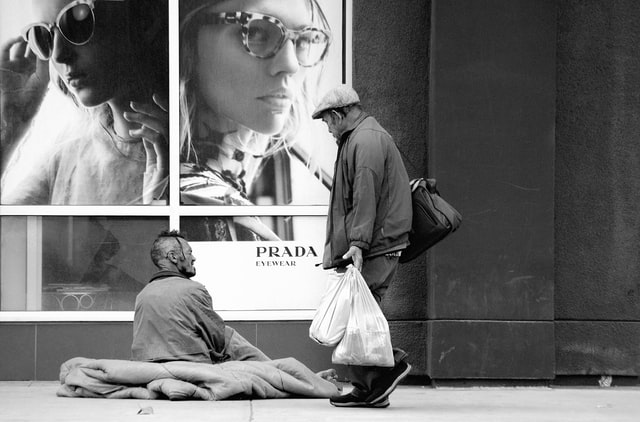
Why is the issue of economic inequality being mitigated? The answer might be richer than you think.
Photo by Max Böhme on Unsplash
By Akshaya Jegaruban
There is a prevalent widespread assumption that global economic inequality has seen a decrease recently ; this is far from the true picture . The misconception of economic equality can only be considered a fallacy veiled by global economic growth and the idea that ‘rising tides lift all boats’ endorsed by trickle down economists. When taking a closer look at the data measure’s of global inequality such as the Gini index, it seemingly suggests that inequality has decreased (Brankovic ,2016) globally , but this reduction is merely symptomatic of India and china’s convergence to the west though it’s large scale poverty reduction (Duprat , 2018:5) . So to what extent does economic inequality extend globally?
Inequality is relative to the society you inhabit, global trends indicated that Billionaires and the top 1% obtain income/wealth growth in an unequal economy disproportionate to other strata’s. Reportedly there has been stagnation in incomes amongst the lower and middle groups and surges in Ultra wealthy net worth individuals, despite economic growth the gap increases. World Inequality report 2022, as global wealth has risen by 1%, but the top 0.001% experienced 14% of this growth from 2019-2021. The Social Gradient explains the lack of mobility (Wilkinson,R & Pickett, K ) , we stand In relation to the other social strata’s , therefore the poor congregate at the bottom and face barriers to mobility due to low levels of material opportunities. Whilst the rich continue to become richer ; this being symptomatic of the unequal distribution within unequal society.
The truth is global inequality systematically advantages, the top decile of income earners and wealth owners. The economic assumption that ‘rising tides lift all boats’ , is supported by functionalists who may argue that inequality inherently functions to improve all living standards. However (Wilkinson, R.G & Pickett,K. 2010) , state that economic growth and increases in average incomes have ceased to contribute much to wellbeing in rich countries. It can be stated confidently that the richest are the only people benefitting by income inequality (Figure 9) the average annual wealth growth rate, shows only the top 1% benefitted from high growth rates (3%-9% ) compared to (3%-4%) by the 50% lowest half. (Wilkinson, R.G.& Pickett, K. 2010) , Bring up the idea that unequal society is disadvantageous for society as a whole limited levels of practical action being taken to reduce health and social problems root from the lack of social incentive to resolve such issues.
The prevalent issue at hand Is the role that Billionaires, play in sustain economic inequality as it bodes to their advantage. (Wilkinson, R.G.& Pickett, K. 2010), societies structure by nature is hierarchical, implicating the position of policy makers and those in society with capital. With wealth comes the power to dictate policies. The very constitution of democracy has been questioned after considering the role of transnational companies in lobbying polices towards their favour. It’s reported that, nations across the world are annually losing $483 Billion to global tax abuse by the wealthy. With Billionaires increased level of capital, we have seen a decrease in political accountability, this wealth further enables them to lobby governments in producing polices that favour economic inequality. Billionaires are even seen to influence public discourse, attempting to shift narratives that implicates their concentrated capital as a social issue: (https://edition.cnn.com/2019/08/16/media/jeff-bezos-donald-graham/index.html)
Rising inequality is an inventible result of capitalism, wealth is built on un-meritocratic grounds, therefore stark economic inequality will unequivocally be sustained. Arguably as long as they benefit, inequality will continue as it progresses.
Its been established that greater economic growth does not lead to economic equality, and the role the wealthy play in essentially pioneering inequality. (Hickel 2018), suggests a revisionist approach to power relations, disenabling billionaires’ ability to monopolise politics by promoting a greater global south representation in global organisation’s such as the World Bank, IMF and World Trade organisation. Therefore, attempting equalise power in the political discourse. So that billionaires aren’t able to freely able to exploit the lower half of society for their economic gain. Pickett suggests more progressive income taxes and on Global Wealth on individual and corporation to limit the lack of economic distribution.
Although the resolutions are largely economic and political, the capital that Billionaires obtain decentralises power from alleged neutral bodies of government posing the question can policy reform alone displace the Wealthy from continuing to exacerbate economic inequality?

0 Comments